First published: May 2, 2017
Last updated: August 20, 2024
Guidelines for Authors
Contents
1 ABOUT THE BAISHIDENG
1.1 Journals List
1.2 Open-Access
1.3 Copyright
1.4 Article Processing Charge
1.5 Privacy Policy
1.6 Disclaimer Statement
1.7 Publisher
1.8 Help Desk
1.9 Website
1.10 Submit a Manuscript
2 PUBLISHING PROCESS
3 GUIDELINES FOR MANUSCRIPT PREPARATION, SUBMISSION, AND MANUSCRIPT FORMAT
3.1 Editorial
3.2 Frontier
3.3 Guidelines
3.4 Field of Vision
3.5 Opinion Review
3.6 Expert Consensus
3.7 Evidence Review
3.8 Review
3.9 Minireview
3.10 Case Control Study
3.11 Retrospective Cohort Study
3.12 Retrospective Study
3.13 Clinical Trials Study
3.14 Observational Study
3.15 Prospective Study
3.16 Randomized Controlled Trial
3.17 Randomized Clinical Trial
3.18 Clinical and Translational Research
3.19 Basic Study
3.20 Evidence-Based Medicine
3.21 Systematic Review
3.22 Meta-Analysis
3.23 Scientometrics
3.24 Case Report
3.25 Letter to the Editor
3.26 Correction
3.27 Retraction Note
4 APPEALS AND COMPLAINTS
5 GUIDELINES FOR AUTHORS TO REQUEST WITHDRAWAL OF A MANUSCRIPT
6 ONLINE SUBMISSIONS
7 BAISHIDENG HOMEPAGE, SUBMISSION SITE AND MANUSCRIPT TYPES
1 ABOUT THE BAISHIDENG
Baishideng Publishing Group (Baishideng) publishes 47 peer-reviewed, open-access journals covering a broad range of topics in clinical medicine, as well as several topics in biochemistry and molecular biology, relevant to human health today.
1.1 Journals List. Baishideng publishes the following 47 journals:
Artificial Intelligence in Cancer
Artificial Intelligence in Gastroenterology
Artificial Intelligence in Gastrointestinal Endoscopy
Artificial Intelligence in Medical Imaging
World Journal of Anesthesiology
World Journal of Biological Chemistry
World Journal of Clinical Cases
World Journal of Clinical Infectious Diseases
World Journal of Clinical Oncology
World Journal of Clinical Pediatrics
World Journal of Clinical Urology
World Journal of Critical Care Medicine
World Journal of Experimental Medicine
World Journal of Gastroenterology
World Journal of Gastrointestinal Endoscopy
World Journal of Gastrointestinal Oncology
World Journal of Gastrointestinal Pathophysiology
World Journal of Gastrointestinal Pharmacology and Therapeutics
World Journal of Gastrointestinal Surgery
World Journal of Medical Genetics
World Journal of Meta-Analysis
World Journal of Obstetrics and Gynecology
World Journal of Ophthalmology
World Journal of Otorhinolaryngology
World Journal of Surgical Procedures
World Journal of Translational Medicine
World Journal of Transplantation
Shijie Huaren Xiaohua Zazhi/World Chinese Journal of Digestology
1.2 Open-Access. All articles published by Baishideng are selected by an in-house editor and fully peer-reviewed by external reviewers. Baishideng applies the Creative Commons Attribution Non Commercial (CC BY-NC 4.0) license, which permits others to distribute, remix, adapt, build upon the published works non-commercially, and license the derivative works on different terms, provided the original work is properly cited and the use is non-commercial. See: https://creativecommons.org/licenses/by-nc/4.0/
1.3 Copyright. Copyright belongs to the author(s) for all articles published by Baishideng. All rights are reserved.
1.4 Article Processing Charge. For detailed information, please visit: https://www.wjgnet.com/bpg/gerinfo/242
1.5 Privacy Policy. Baishideng is committed to the protection of your personal information. Baishideng’s privacy policy applies only to information collected by Baishideng through the www.wjgnet.com website. For details about the privacy policy, please visit: https://www.wjgnet.com/bpg/gerinfo/269
1.6 Disclaimer Statement. All articles published in journals owned by Baishideng represent the views and opinions of their authors, and not the views, opinions or policies of Baishideng, except where explicitly indicated otherwise.
1.7 Publisher. Baishideng Publishing Group Inc, 7041 Koll Center Parkway, Suite 160, Pleasanton, CA 94566, USA.
1.8 Help Desk. For details, please visit: https://www.f6publishing.com/helpdesk
1.9 Website. For details, please visit: https://www.wjgnet.com
1.10 Submit a Manuscript. For details, please visit the F6Publishing system at: https://www.f6publishing.com
2 PUBLISHING PROCESS
Step 1 Manuscript reception and registration
Step 2 Initial review by Journal’s Editor-in Chief/Associate Editor or Science Editor
Step 3 Peer-review by Peer-Reviewers/Editorial Board Members. For more information on the manuscript peer review process, please visit our website at http://www.wjgnet.com/bpg/GerInfo/241
Step 4 End of peer-review, then, start the first decision making
Step 5 First decision by Science Editor of the publisher, the Journal’s Editor-in-Chief, and the Executive Editor-in-Chief of the publisher. For more information on the academic integrity, persons responsible for manuscript decision, and the decision process, please visit our website at https://www.wjgnet.com/bpg/Gerinfo/316
Step 6 Revision by the author(s)
Step 7 Second decision by Science Editor of the publisher (manuscript editing and processing), the Journal’s Editor-in-Chief (controls academic quality), and the Language Editor (controls language quality)
Step 8 Third/Final decision by the Executive Editor-in-Chief of the publisher (controls publishing quality)
Step 9 Final acceptance and charging of publication fee
Step 10 Language editing
Step 11 Production
Step 12 Proofreading by Production Department Director
Step 13 Release of online open-access papers in electronic form on the Baishideng website
Step 14 End of the publication process, then, store documents and notify the datebase to index the article
3 GUIDELINES FOR MANUSCRIPT PREPARATION, SUBMISSION, AND MANUSCRIPT FORMAT
The following manuscript type will be published in the Baishideng series journals:
3.1 Editorial. Editorial Board Members/Peer Reviewers are invited to make comments on an important topic in their field, regarding its current research status and future directions that will promote development of this discipline. The detailed writing requirements of Editorial can be found at: https://www.wjgnet.com/bpg/GerInfo/214
3.2 Frontier. Highly influential scientists are invited to write a Frontier article select a highly cited, cutting-edge original paper of his/her own and summarize the major findings, the problems that have been resolved and remain to be resolved, and the future research directions, in order to help readers understand his/her important academic point of view and perspectives on the directions of research in their field. The detailed writing requirements for the Frontier article can be found at: https://www.wjgnet.com/bpg/GerInfo/216
3.3 Guidelines. Guidelines articles are submitted by any author and describe a guideline in medicine research. The detailed writing requirements for the Guidelines article can be found at: https://www.wjgnet.com/bpg/GerInfo/297
3.4 Field of Vision. Highly influential scientists are invited to write a Field of Vision commentary on recent perspectives of seminal articles, on hot topic articles, or the latest articles in the research field in order to keep readers at the forefront of research and increase the impact of their clinical research. Seminal (classic) articles are papers that are included in the Web of Knowledge and which have received a large number of citations (ranking in the top 1%) after being published for more than 3 years, reflecting the article’s quality and impact on the field. Hot topic articles are papers that are included in the Web of Knowledge and have received a large number of citations after being published for no more than 2 years, reflecting their representation of cutting-edge trends in scientific research. Latest articles are the most recently published high-quality papers that are included in PubMed and which reflect the latest trends in the author’s research field. In general, these commentary type articles will focus on the status quo of the overall research in the field, highlighting the most important research topics, the problems that have now been resolved and remain to be resolved, and the future research directions that may maximize the practical impact on a field. The basic information for the article that is the subject of these types of commentaries will be clearly stated at the beginning of the new article and will include author names, article title, journal name, year, volume, and inclusive page numbers. The detailed writing requirements for the Field of Vision article can be found at: https://www.wjgnet.com/bpg/GerInfo/215
3.5 Opinion Review. Highly influential scientists are invited to write Opinion Review articles that will focus on the status quo of the overall research in the field, highlighting the most important research topics, the problems that have now been resolved and remain to be resolved, and the future research directions that may maximize the practical impact on a field. The detailed writing requirements for the Opinion Review article can be found at: https://www.wjgnet.com/bpg/GerInfo/298
3.6 Expert Consensus. The detailed writing requirements for the Expert Consensus article can be found at: https://www.wjgnet.com/bpg/GerInfo/315
3.7 Evidence Review. The detailed writing requirements for the Evidence Review article can be found at: https://www.wjgnet.com/bpg/GerInfo/314
3.8 Review. Highly influential scientists are invited to write a Review article that will focus on the status quo of the overall research in the field, highlighting the most important research topics, the problems that have now been resolved and remain to be resolved, and the future research directions that may maximize the practical impact on a field. The detailed writing requirements for the Review article can be found at: https://www.wjgnet.com/bpg/GerInfo/217
3.9 Minireview. Highly influential scientists are invited to write a Minireview article on recent advances and trends in molecular biology, genomics, and related cutting-edge technologies to provide readers with the latest knowledge and to help improve their diagnostic and therapeutic skills. The detailed writing requirements for the Minireview article can be found at: https://www.wjgnet.com/bpg/GerInfo/192
3.10 Case Control Study. The Case Control Study article can be submitted by any author and is structured as the identification of person/s with a disease of interest and a control (comparison, referent) group without the disease, followed by a description of the relationship of an attribute of the disease and its examination by comparative analysis of diseased vs non-diseased persons, with regard to the frequency or levels of the attribute in each group. The detailed writing requirements for the Case Control Study article can be found at: https://www.wjgnet.com/bpg/GerInfo/195
3.11 Retrospective Cohort Study. The Retrospective Cohort Study article can be submitted by any author and will describe a research study in which the medical records of groups of individuals who are alike in many ways but differ in a certain characteristic (for example, female nurses who smoke and those who do not smoke) are compared for a particular outcome (such as gastric cancer). The detailed writing requirements for the Retrospective Cohort Study article can be found at: https://www.wjgnet.com/bpg/GerInfo/210
3.12 Retrospective Study. The Retrospective Study article can be submitted by any author and will describe a study to test etiologic hypotheses by which inferences about an exposure to putative causal factors are derived from data relating to characteristics of persons under study or to events or experiences in their past. The essential feature of the retrospective study is that some of the persons under study have the disease or outcome of interest and their characteristics are compared with those of unaffected persons. The detailed writing requirements for the Retrospective Study article can be found at: https://www.wjgnet.com/bpg/GerInfo/211
3.13 Clinical Trials Study. The Clinical Trials Study article can be submitted by any author and will describe a pre-planned study of the safety, efficacy, or optimum dosage schedule (if appropriate) of one or more diagnostic, therapeutic or prophylactic technique(s), device(s) or drug(s) selected according to predetermined criteria of eligibility and observed for predefined evidence of favorable and/or unfavorable effects. The detailed writing requirements for the Clinical Trials Study article can be found at: https://www.wjgnet.com/bpg/GerInfo/196
3.14 Observational Study. The Observational Study article can be submitted by any author and will describe a clinical study in which participants may receive diagnostic, therapeutic or other types of interventions, but the investigator does not assign participants to receive specific interventions (as in an interventional study). The detailed writing requirements for the Observational Study article can be found at: https://www.wjgnet.com/bpg/GerInfo/200
3.15 Prospective Study. The Prospective Study article can be submitted by any author and will describe an observational study of a population for a sufficient number of persons over a sufficient number of years to generate incidence and/or mortality rates subsequent to the selection of the study group. The detailed writing requirements for the Prospective Study article can be found at: https://www.wjgnet.com/bpg/GerInfo/201
3.16 Randomized Controlled Trial. The Randomized Controlled Trial article can be submitted by any author and will describe a clinical trial that involves at least one test treatment and one control treatment, concurrent enrollment and follow-up of the test- and control-treated groups, and in which the treatments to be administered are selected/assigned by a random process, such as the use of a random-numbers table. The detailed writing requirements for the Randomized Controlled Trial article can be found at: https://www.wjgnet.com/bpg/GerInfo/209
3.17 Randomized Clinical Trial. The Randomized Clinical Trial article can be submitted by any author and will describe a clinical trial in which the participants are assigned by chance to separate groups for comparison of different treatments; neither the researchers nor the participants can choose which group any individual is ultimately assigned to. Using chance to assign people to groups means that the groups will be similar and that the treatments they receive can be compared objectively. At the time of the trial, it is not known which treatment is best. Finally, study participation in a randomized trial is completely at the discretion of the patient. The detailed writing requirements for the Randomized Clinical Trial article can be found at: https://www.wjgnet.com/bpg/GerInfo/202
3.18 Clinical and Translational Research. The detailed writing requirements for the Clinical and Translational Research article can be found at: https://www.wjgnet.com/bpg/GerInfo/313
3.19 Basic Study. The Basic Study article can be submitted by any author and is written to describe and detail basic studies of novel and innovative findings in medical basic research. The detailed writing requirements for the Basic Study article can be found at: https://www.wjgnet.com/bpg/GerInfo/218
3.20 Evidence-Based Medicine. The Evidence-Based Medicine article can be submitted by any author and will describe an approach of practicing medicine with the goal to evaluate and improve patient care. These articles require the judicious integration of the best research evidence with patient values to help guide decisions in medical care and aim to help physicians in making proper diagnoses, devising the best testing strategies, choosing the best treatments and/or methods of disease prevention, and developing guidelines for large groups of patients with the same disease. The detailed writing requirements for the Evidence-Based Medicine article can be found at: https://www.wjgnet.com/bpg/GerInfo/198
3.21 Systematic Review. The Systematic Review article can be submitted by any author and will summarize the recent and comprehensive published material on a particular subject, without bias. The degree of comprehensiveness may vary (from broad to narrow) according to the time range of material scrutinized, but the systematic reviews that are most often desired for publication focus on the current literature. The textual material examined for systematic reviews may be equally broad or narrow and can encompass, for medicine-related topics specifically, clinical material as well as experimental research or case reports. State-of-the-art reviews tend to address more current matters. The Systematic Review article must be distinguishable from a HISTORICAL ARTICLE on the same subject, but a review of the historical literature is also within the scope of this publication type. The detailed writing requirements for the Systematic Review article can be found at: https://www.wjgnet.com/bpg/GerInfo/203
3.22 Meta-Analysis. The Meta-Analysis article can be submitted by any author and are composed of a systematic review, mixed treatment comparison, meta-regression, and overview of reviews, and provide a summary of a given quantitative effect (e.g., the effectiveness and safety of clinical treatments determined by combining data from two or more randomized controlled trials, thereby providing more precise and externally valid estimates than those that would be obtained from each individual dataset if analyzed separately from the others). The detailed writing requirements for the Meta-Analysis article can be found at: https://www.wjgnet.com/bpg/GerInfo/278
3.23 Scientometrics. The Scientometrics article can be submitted by any author and will describe a study that measures and analyzes science research. In practice, scientometrics is often carried out using bibliometrics (a measurement of the impact of (scientific) publications). The detailed writing requirements for the Scientometrics article can be found at: https://www.wjgnet.com/bpg/GerInfo/212
3.24 Case Report. The Case Report article can be submitted by any author and will report a rare or typical case or case series. The detailed writing requirements for the Case Report article can be found at: https://www.wjgnet.com/bpg/GerInfo/187
3.25 Letter to the Editor. The Letter to the Editor article can be submitted by any author and will either discuss and make reply to topics published in any of the Baishideng -published journals or introduce and comment on a controversial issue of general interest. The detailed writing requirements for the Letter to the Editor article can be found at: https://www.wjgnet.com/bpg/GerInfo/219
3.26 Correction. The detailed writing requirements for the Correction article can be found at: https://www.wjgnet.com/bpg/GerInfo/295
3.27 Retraction Note. The detailed writing requirements for the Retraction Note article can be found at: https://www.wjgnet.com/bpg/GerInfo/296
4 APPEALS AND COMPLAINTS
Authors may appeal an editorial decision if they feel that the decision to reject was based on either a significant misunderstanding of a core aspect of the manuscript or concerns regarding the manuscript-handling process.
To raise an appeal about manuscript peer-review, first decision, manuscript revision, editing, and/or second decision, please contact the Science Editor Development Department Director, Jia-Ping Yan via email: j.p.yan@wjgnet.com.
To raise an appeal about manuscript production, including typesetting, and/or online releasing, please contact the Production Department Director, Xiang Li via email: x.li@wjgnet.com.
For either type of appeal, please quote your manuscript number ID and an explanation of your rationale for the appeal in your email.
To raise a complaint regarding editorial staff, peer reviewer/editorial board, publisher, and/or publishing policies or processes, please contact the Baishideng Office via email at office@baishideng.com.
For detailed information about the policies on handle appeals and complaints, please visit at: https://www.wjgnet.com/bpg/gerinfo/312.5 GUIDELINES FOR AUTHORS TO REQUEST WITHDRAWAL OF A MANUSCRIPT
Although rare, during the manuscript publishing process and after the publication of manuscripts, some authors are faced with the need to request Baishideng to withdraw/ retraction their manuscript due to many reasons. In recognition of this weighty decision, Baishideng will carefully evaluate any author-initiated manuscript withdrawal/ retraction request based upon the principles of respecting and understanding the details provided with the request. If you are faced with this situation, we request that you and all co-authors conform to the guidelines: https://www.wjgnet.com/bpg/GerInfo/300.
6 ONLINE SUBMISSIONS
Since the Baishideng does not return or save any of the documents related to a rejected manuscript, the authors should retain one copy of the text, tables, photographs and illustrations. In addition, the editors are not responsible for loss or damage to photographs and illustrations that may have been sustained during mailing. Manuscripts should be submitted through the online submission platform, the F6Publishing system. If you have any questions, please feel free to contact us via e-mail at: editorialoffice@wjgnet.com or online at the Help Desk.
7 BAISHIDENG HOMEPAGE, SUBMISSION SITE AND MANUSCRIPT TYPES
7.1 F6Publishing: https://www.f6publishing.com. You are welcomed to submit your manuscript to the Baishideng series of journals via F6Publishing. Manuscript Types Accepted: Editorial, Frontier, Guidelines, Expert Consensus, Field of Vision, Minireview, Review, Opinion Review, Case Control Study, Clinical Trials Study, Observational Study, Prospective Study, Randomized Clinical Trial, Randomized Controlled Trial, Retrospective Cohort Study, Retrospective Study, Basic Study, Evidence-Based Medicine, Systematic Review, Meta-Analysis, Scientometrics, Case Report, Letter to the Editor, Correction, and Retraction Note.
|
 |
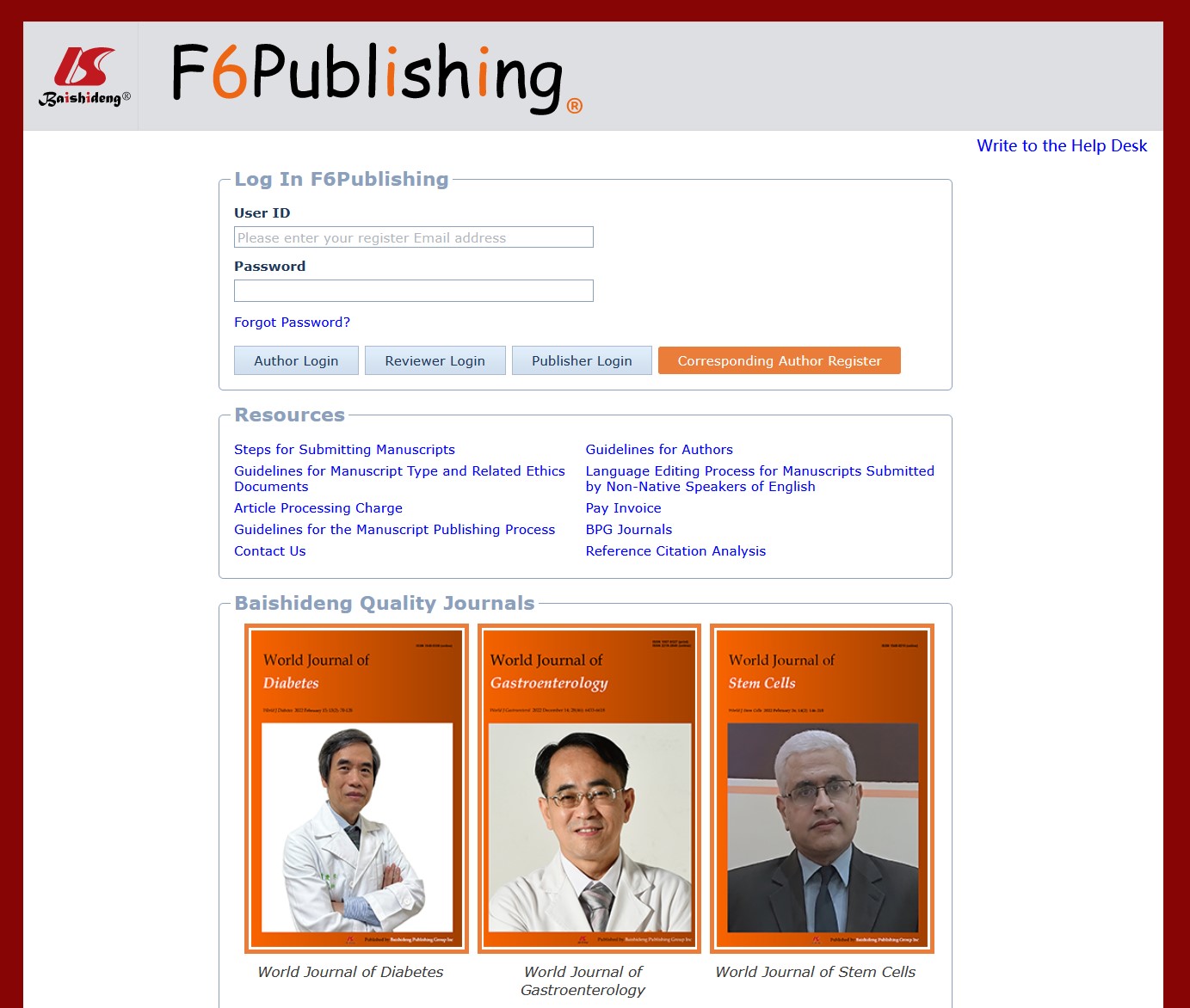 |
7.2 Baishideng Series of Journals: https://www.wjgnet.com/bpg/journals.htm.
|
 |
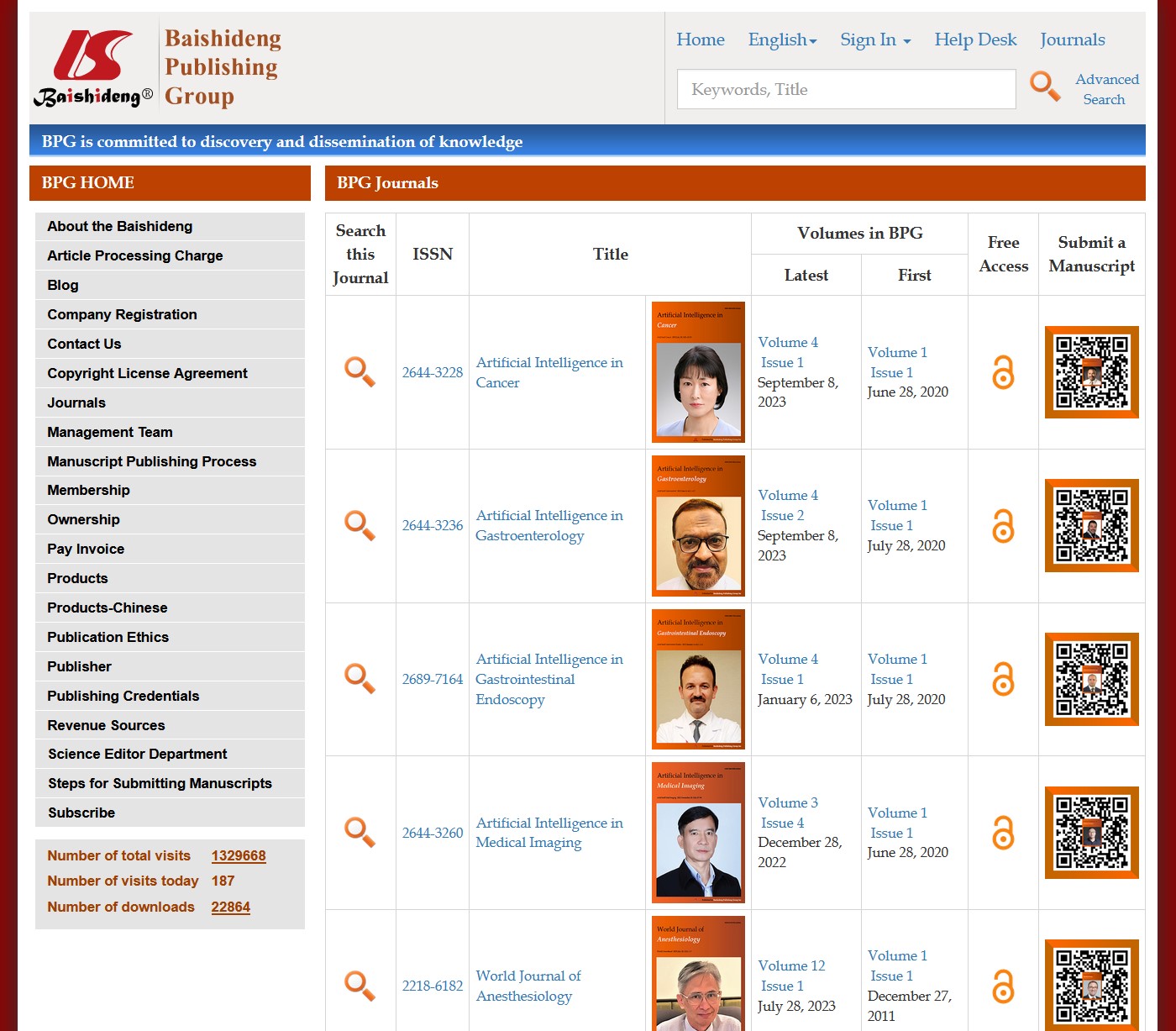 |
7.3 Guidelines for Authors: https://www.wjgnet.com/bpg/gerinfo/204.
|
 |
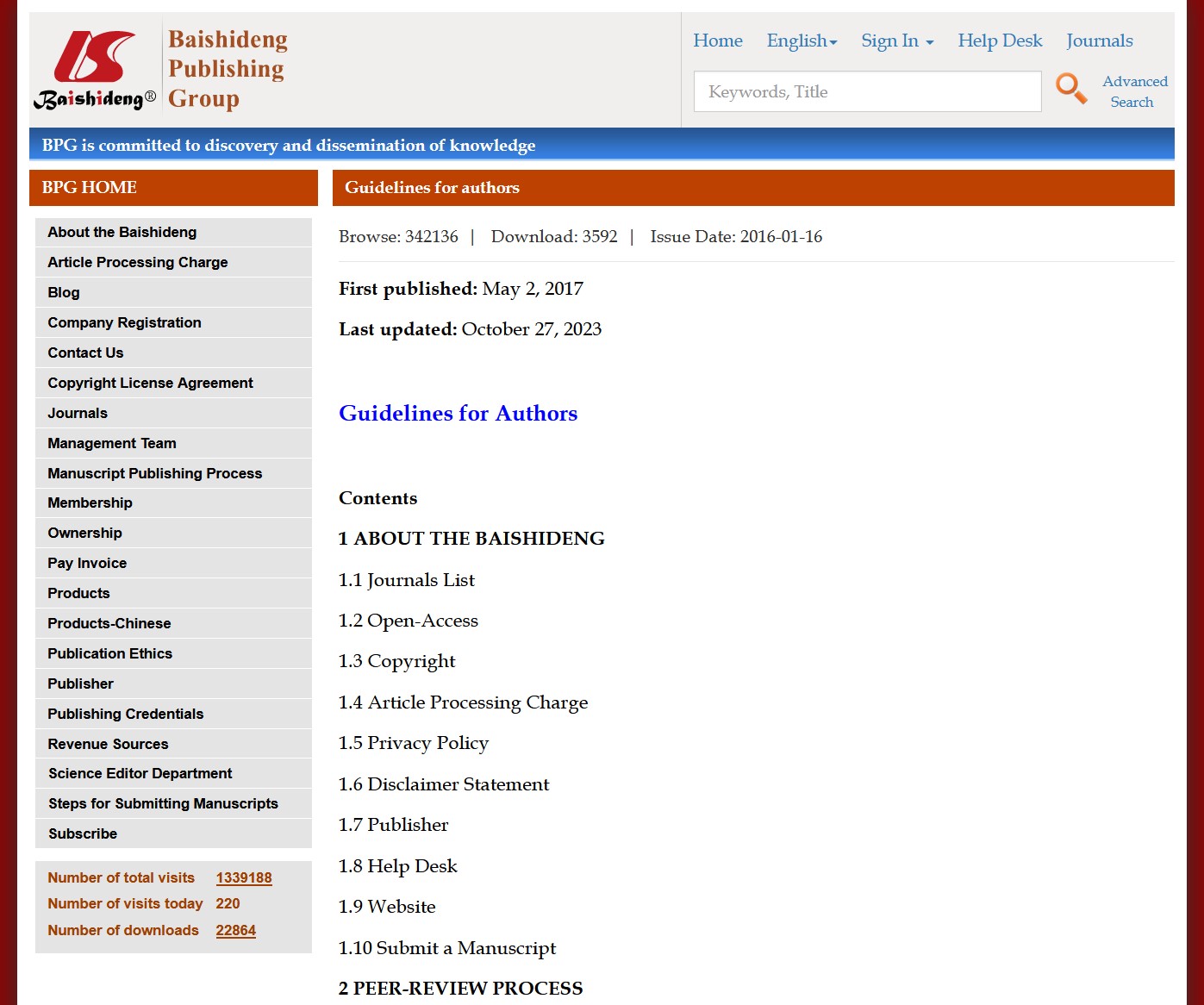 |
7.4 Baishideng Official Website: https://www.wjgnet.com
|
 |
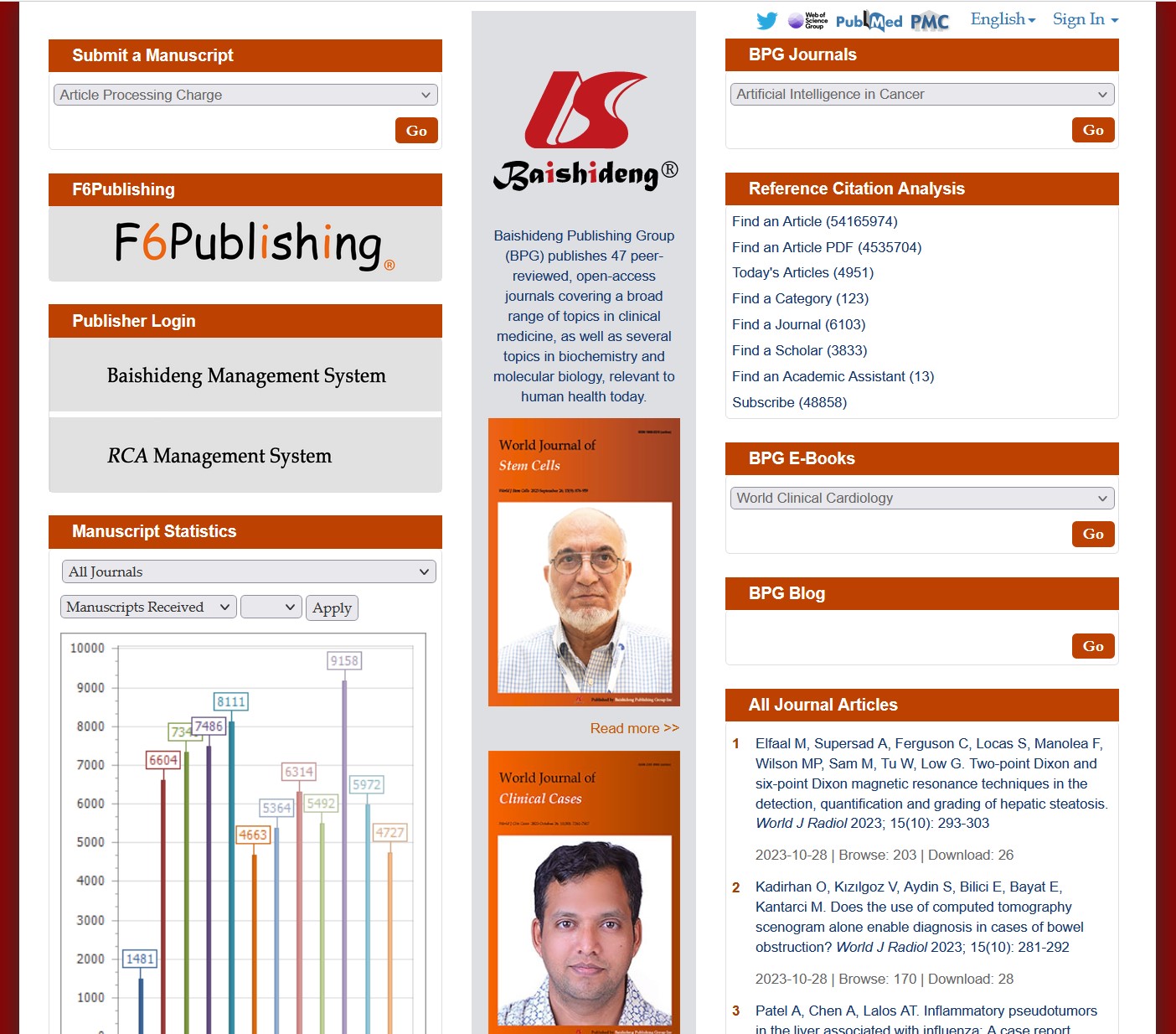 |
7.5 RCA Home Page: https://referencecitationanalysis.com/
|
 |
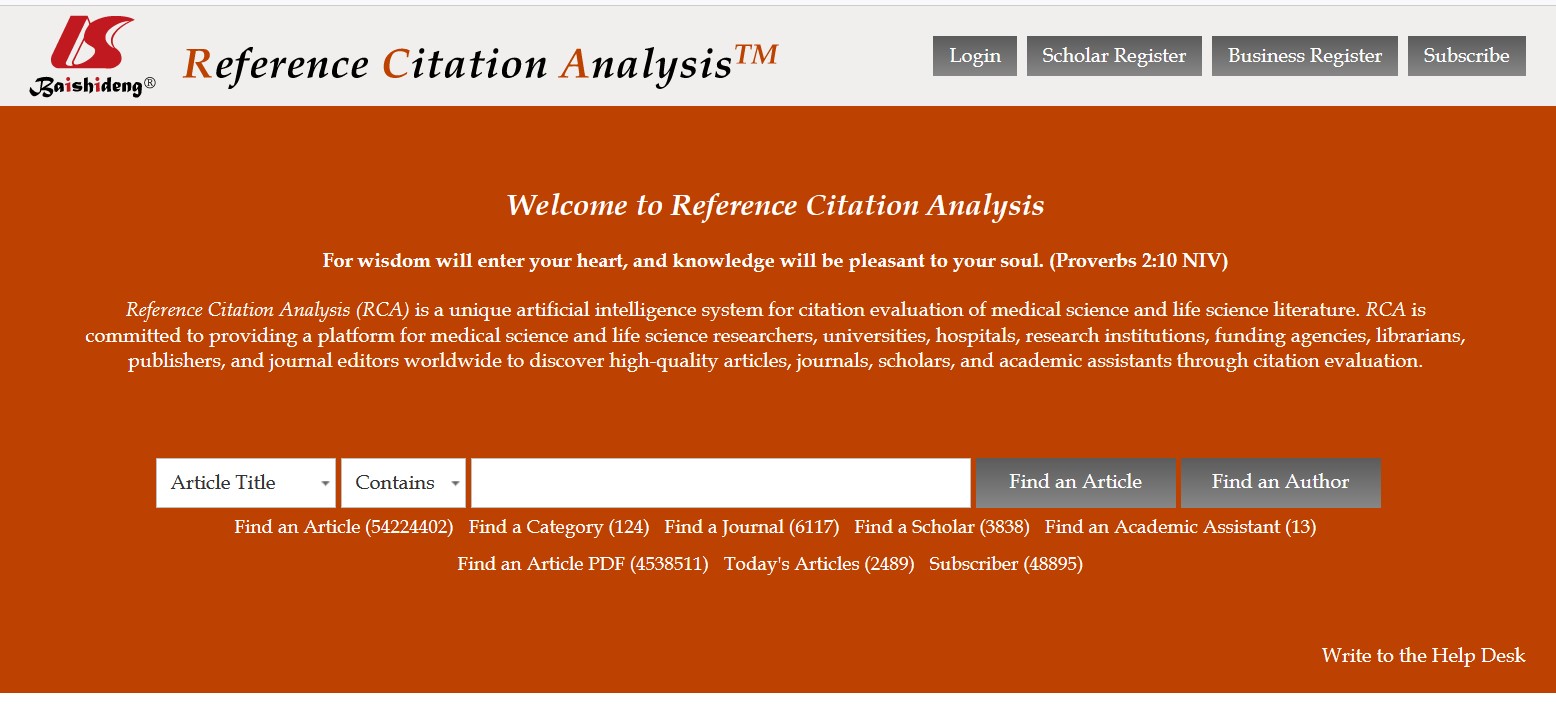 |

